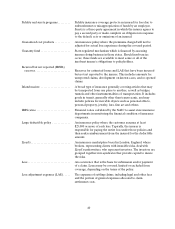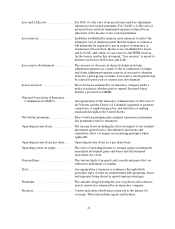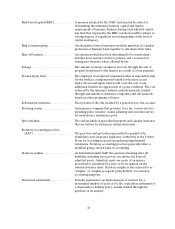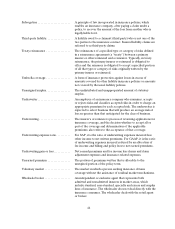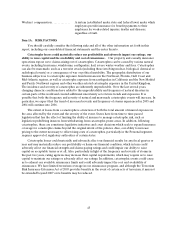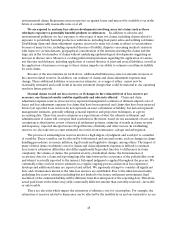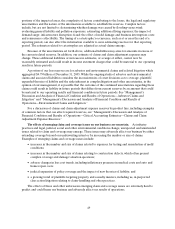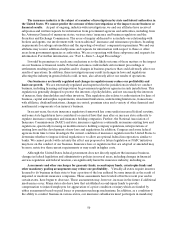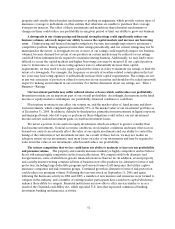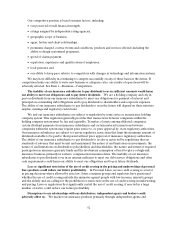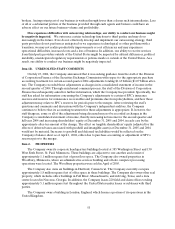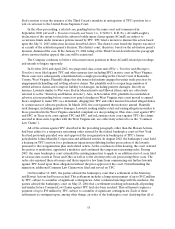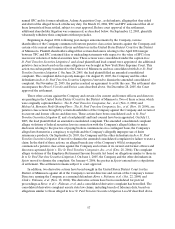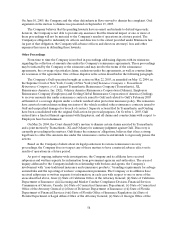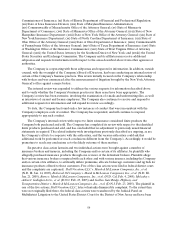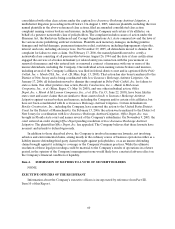Travelers 2005 Annual Report Download - page 62
Download and view the complete annual report
Please find page 62 of the 2005 Travelers annual report below. You can navigate through the pages in the report by either clicking on the pages listed below, or by using the keyword search tool below to find specific information within the annual report.50
The insurance industry is the subject of a number of investigations by state and federal authorities in
the United States. We cannot predict the outcome of these investigations or the impact on our business or
financial results.As part of ongoing, industry-wide investigations, we and our affiliates have received
subpoenas and written requests for information from government agencies and authorities, including from
the Attorneys General of numerous states, various states’ insurance and business regulators and the
Securities and Exchange Commission. The areas of inquiry addressed to us include our relationship with
brokers and agents, our involvement with “non-traditional” insurance and reinsurance products,branding
requirements for salvage automobiles and the reporting of workers’ compensation premiums. We and our
affiliates may receive additional subpoenas and requests for information with respect to these or other
areas from government agencies or authorities. We are cooperating with these subpoenas and requests for
information. For further information, see “Part I—Item 3—Legal Proceedings”.
It would be premature to reach any conclusions as to the likely outcome of these matters or the impact
on our business or financial results. Potential outcomes could include enforcement proceedings or
settlements resulting in fines, penalties and/or changes in business practices that could adversely affect our
results of operations. In addition, these investigations may result in changes in laws and regulations
affecting the industry in general which could, in turn, also adversely affect our results of operations.
Our businesses are heavily regulated and changes in regulation may reduce our profitability and
limit our growth. We are extensively regulated and supervised in the jurisdictions in which we conduct
business, including licensing and supervision by government regulatory agencies in such jurisdictions. This
regulation is generally designed to protect the interests of policyholders, and not necessarily the interests
of insurers, their shareholders and other investors. This regulation also relates to authorization for lines of
business, capital and surplus requirements, investment limitations, underwriting limitations, transactions
with affiliates, dividend limitations, changes in control, premium rates and a variety of other financial and
nonfinancial components of an insurer’s business.
In recent years, the state insurance regulatory framework has come under increased federal scrutiny,
and some state legislatures have considered or enacted laws that may alter or increase state authority to
regulate insurance companies and insurance holding companies. Further, the National Association of
Insurance Commissioners (NAIC) and state insurance regulators continually reexamine existing laws and
regulations, specifically focusing on modifications to holding company regulations, interpretations of
existing laws and the development of new laws and regulations. In addition, Congress and some federal
agencies from time to time investigate the current condition of insurance regulation in the United States to
determine whether to impose federal regulation or to allow an optional federal incorporation, similar to
banks. We cannot predict with certainty the effect any proposed or future legislation or NAIC initiatives
may have on the conduct of our business. Insurance laws or regulations that are adopted or amended may
be more restrictive than current requirements or may result in higher costs.
Although the United States federal government does not directly regulate the insurance business,
changes in federal legislation and administrative policies in several areas, including changes in financial
services regulation and federal taxation, can significantly harm the insurance industry, including us.
Assessments and other surcharges for guaranty funds, second-injury funds,catastrophe funds and
other mandatory pooling arrangements may reduce our profitability.Virtually all states require insurers
licensed to do business in their state to bear a portion of the loss suffered by some insureds as the result of
impaired or insolvent insurance companies. These assessments have leveled off in the recent year and in
certain states, have begun to decrease. These assessments may, however, increase in the future if additional
insolvencies occur. Many states also have laws that established second-injury funds to provide
compensation to injured employees for aggravation of a prior condition or injury which are funded by
either assessments based on paid losses or premium surcharge mechanisms. In addition, as a condition to
the ability to conduct business in various states, our insurance subsidiaries must participate in mandatory


